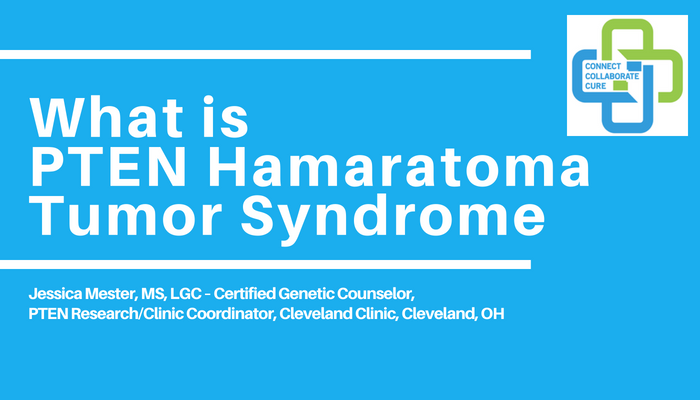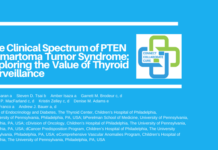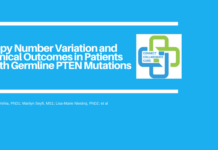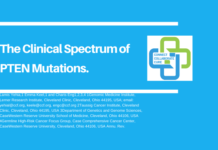PTEN Hamartoma Tumor syndrome (PHTS) is a rare genetic condition that causes an increased risk for certain cancers, benign growths, and neurodevelopmental disorders. PHTS describes any person who is found to have a change, or mutation, in the PTEN gene; some persons may also carry diagnoses of Cowden syndrome or Bannayan-Riley-Ruvalcaba syndrome, which are based on their personal medical history and the features they have developed.  One of PTEN’s roles in the body is as a tumor suppressor gene, which means that when it’s working properly, PTEN helps suppress the growth of any cells which are trying to grow out of control and become tumors. All of our genes come in pairs; persons without PHTS have two working PTENgene copies in each of their cells. In people with PHTS one of these PTEN gene copies has a change that makes it notwork in each of the body’s cells. As you can imagine, this puts people with PHTS at increased risk to develop tumors.
Fortunately, most tumors that develop in persons with PHTS are benign, meaning they will not turn into a malignant cancer that can then metastasize or spread, to other body parts. Persons with PHTS commonly develop benign growths, most of which are small, of the skin, tongue, and gums by adulthood. It has recently been discovered that colon polyps of various types, most of which have a low potential to develop into a malignancy, are seen in most adults who have an endoscopy (colonoscopy or upper). Benign breast lumps, thyroid nodules/goiter, and uterine fibroids are also common. Vascular malformations needing surgical intervention may also occur. A benign tumor of the cerebellum called Lhermitte-Duclos disease develops in a minority of adults with PHTS. Macrocephaly (larger than average head size) is common, and some children with PHTS are identified due to the presence of developmental delays and autism spectrum disorders. However, many persons with PHTS had no developmental challenges early in life and have successful careers as doctors, lawyers, or whatever other path they wished to follow.
For a person with PHTS, three different studies have found increased lifetime risks for specific cancer types. The study with the largest number of patients found the following cancer risks (to age 70): breast (85%), thyroid (35%), kidney (34%), uterus (28%), colorectal (9%), and melanoma (6%).  This study also recommends the following cancer screening recommendations:
- Breast (women): start high-risk breast screening (mammogram or MRI) plus clinical breast exam every 6 months starting at age 30
- Thyroid: annual ultrasound starting at age of diagnosis
- Kidney: imaging every two years starting at age 40
- Uterine: see a gynecologic oncologist starting at age 30 to discuss uterine cancer surveillance options
- Colon: baseline colonoscopy at age 35-40; follow-up dependent on number and type of polyps
- Skin: yearly dermatologic checks
Some patients wish to consider prophylactic surgeries, like mastectomy (breast) and hysterectomy (uterus) where at-risk tissue is removed prior to cancer development.
Just like snowflakes, no two individuals with PHTS are alike. While some may develop hundreds of colon polyps, others may only develop a few. Similarly, while some persons have such severe thyroid disease that they require more frequent monitoring or even a thyroidectomy (thyroid removal) surgery, others do not. Given the differing needs of each person, screening and healthcare recommendations often vary from person to person. It can be helpful for persons with a complex condition like PHTS to have a “quarterback†who understands their management needs and helps coordinate visits and screenings with appropriate specialists; for some this quarterback may be their primary care provider, for others it is the genetic counselor or geneticist who made their diagnosis. Persons with PHTS are commonly connected with specialty physicians in the areas of high-risk breast care, endocrinology, gynecology-oncology, dermatology, and gastroenterology to help with their management.
PHTS is inherited in an autosomal dominant manner; this means that each child of an affected person has a 50% chance to inherit their PTENgene mutation and thus also have PHTS. It also means that their siblings, parents, and other relatives are at increased risk to share their specific PTENmutation. Once a PTENmutation is known to exist in a family, it is much cheaper for relatives to have testing for a known mutation as opposed to testing the entire PTENgene. If you have PHTS, consider sharing your PTENtesting results with your relatives. If they have a copy of your test result, they can take it to any genetics provider, who will then be able to discuss testing with them and help them figure out if being tested is the right decision for them at this point in their lives. Genetic counselors in the United States and Canada can be found by going to the National Society of Genetic Counselors website: www.nsgc.org.
For many persons, learning of their or their child’s PHTS diagnosis is a relief and gives them an explanation for many of the medical issues they may have faced during their lives. Some persons may feel scared, angry, or confused about their diagnosis – all of these feelings are valid, and for some people, it’s helpful to share their feelings with others who also have PHTS. Fortunately, there are a few different groups available where patients and families can connect to provide support to one another.
Articles Referenced
- Tan MH, Mester JL, Ngeow J, Rybicki LA, Orloff MS, Eng C: Lifetime Cancer Risks in Individuals with Germline PTEN Mutations. Clinical Cancer Research: An Official Journal of the American Association for Cancer Research 2012, 18(2):400-407.
- Bubien V, Bonnet F, Brouste V, Hoppe S, Barouk-Simonet E, David A, Edery P, Bottani A, Layet V, Caron O et al: High Cumulative Risks of Cancer in Patients with PTEN Hamartoma Tumour Syndrome. Journal of Medical Genetics 2013, 50(4):255-263.
- Nieuwenhuis MH, Kets CM, Murphy-Ryan M, Yntema HG, Evans DG, Colas C, Moller P, Hes FJ, Hodgson SV, Olderode-Berends MJ et al: Cancer Risk and Genotype-Phenotype Correlations in PTEN Hamartoma Tumor Syndrome. Familial Cancer 2013.
- Mester J, Eng C: When Overgrowth Bumps Into Cancer: The PTEN-Opathies. American Journal of Medical Genetics Part C, Seminars in Medical Genetics 2013.







